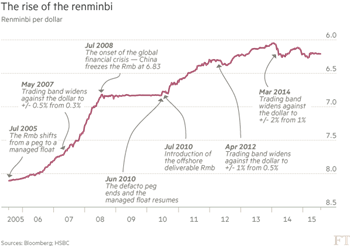(单词翻译:单击)

What a long, strange trip it has been for the renminbi since the Chinese government ended the exchange rate’s strict peg to the US dollar 10 years ago this week.
自10年前中国政府放弃盯住美元的汇率制度以来,人民币经历了一段相当漫长而又奇特的旅程。
At the time, economists hailed the event as a landmark step towards allowing market forces to set the exchange rate and a concession to trading partners who complained that the currency was undervalued. They were not wrong.
当时,经济学家们称赞此举是向着允许市场力量决定汇率的目标迈出的具有里程碑意义的一步,也是对抱怨人民币估值偏低的贸易伙伴做出的让步。他们并未说错。
Yet a decade later, it is striking that while the renminbi has appreciated by a third, government intervention remains a daily reality. While economists expect further steps by the Chinese government to loosen its grip on both the exchange rate and cross-border capital flows, the pace of change over the next 10 years is likely to be slower than in the last.
然而10年后,令人吃惊的是,虽然人民币已经升值三分之一,但政府干预仍是司空见惯。尽管经济学家们期待中国政府将进一步采取措施,放松对汇率和跨境资本流动的控制,但未来10年的改革步伐很可能要慢于过去10年。
Central bank governor Zhou Xiaochuan has made clear that his vision of “capital-account convertibility” — a term that normally refers to unrestricted cross-border fund flows — is compatible with keeping significant capital controls in place indefinitely. Mr Zhou also says he believes convertibility will be achieved by the end of this year. That is a signal that the most important changes have already been announced.
中国央行行长周小川已明确表示了自己的看法:“资本账户自由兑换”(capital-account convertibility)——通常是指不受限制的跨境资金流动——与无限期保持可观程度的资本管制并无矛盾。他还说,他相信今年底将实现自由兑换。这是一个信号,说明最重要的改革举措都已经公布了。
Just as July 2005 ushered in a period of “managed float” for the exchange rate, so the next decade will be characterised by “managed convertibility” for cross-border flows.
正如2005年7月开启了“有管理浮动汇率制”时期一样,未来10年的特征将是对跨境资本流动实行“有管理的自由兑换”。
The underlying logic is clear: market reform is a tool to be deployed only when it delivers tangible benefits. But when such forces threaten to inflict pain on the economy, the government is ready and willing to intervene, as its heavy-handed response to the tumbling stock market also shows.
根本的逻辑很明确:市场化改革是一种工具,只有当它能带来实际利益时才会派上用场。但当市场力量可能对经济造成痛苦时,中国政府就准备而且愿意介入,正如其对股市暴跌的强势回应所展示的。
The 2005 de-peg is another clear example. Chinese authorities believed a stronger currency would promote a rebalancing of the economy towards domestic consumption and away from reliance on investments and exports. But at the onset of the financial crisis in 2008, when stability was the overriding concern, the exchange rate was frozen for another two years.
2005年的脱钩是又一个清晰的案例。中国当局相信,人民币升值将会促进经济再平衡,从依赖投资和出口转向依赖国内消费。但是,2008年金融危机爆发后,当稳定成为压倒一切的任务时,人民币汇率又被冻结了两年。
The performance of the Chinese currency this year is another reminder that the government’s commitment to market reforms is contingent on facts on the ground.
今年人民币的表现再次提醒我们,中国政府对市场化改革的承诺取决于形势。
Since late March, as various financial tempests have raged — unprecedented capital outflow from China, theGreek debt crisis, the stock market boom-bust — the renminbi has remained within a tight range around 6.20 to 6.22 per dollar.
自3月下旬以来,虽然各种金融风暴相继来袭——中国空前的资本外流、希腊债务危机以及股市大起大落——但人民币兑美元汇率一直保持在1美元兑6.20至6.22元人民币的狭窄区间。
The dollar index, which tracks the greenback against a basket of global currencies, has fluctuated by more than 10 per cent from peak to trough in 2015. By contrast, the renminbi exchange rate has moved within a 1.4 per cent range. Since the start of April, renminbi volatility has been even smaller — about 0.5 per cent.
2015年以来,美元指数(衡量美元对一篮子货币汇率变化程度)从峰值至谷底的波动幅度超过了10%。相比之下,人民币汇率仅在1.4%的区间内波动。自4月初以来,人民币的波动幅度甚至更小,只有约0.5%。
Analysts say concern over capital outflows is a key reason that the central bank has tightened its grip on the exchange rate.
分析师们表示,对资本外流的担忧是导致央行收紧汇率控制的关键原因之一。
Even as China ran a merchandise trade surplus worth $263bn in the first six months of 2015, its foreign exchange reserves fell by $150bn. That suggests that inflows from trade have been overwhelmed by investment outflows, a sign of flagging confidence.
即便中国2015年上半年商品贸易顺差达到2630亿美元之际,但其外汇储备减少了1500亿美元。这似乎表明,贸易带来的资本流入赶不上投资资本的流出,这是信心不足的迹象。
If the People’s Bank of China allowed these moderate outflows to weaken the renminbi, that could encourage the outflows, leading to a vicious cycle.
如果中国央行允许这些规模不大的资本流出压低人民币汇率,那将会鼓励资本外流,形成一个恶性循环。
Many of the exchange-rate reforms adopted over the past decade have had little impact on the government’s ability to control the exchange rate.
过去10年采取的许多汇率改革措施,对中国政府操控汇率的能力没什么影响。
In March 2014 the People’s Bank of China widened the band in which the renminbi trades against the dollar. Following this change, the spot exchange rate was permitted to fluctuate by 2 per cent above or below the central bank’s daily fixing, up from 1 per cent previously and just 0.3 per cent in 2005.
2014年3月,中国央行扩大了人民币兑美元交易价浮动幅度。这意味着,即期汇率被允许在央行当日人民币兑美元中间价上下2%的幅度内浮动,高于此前的1%,而2005年时的幅度仅为0.3%。
Yet the wider band hardly makes government intervention more difficult. The PBoC need only set its fixing farther away from the spot rate to achieve the same effect. That is exactly what it has done this year. The renminbi spot rate has traded weaker than the PBoC fix by an average of 1.5 per cent in 2015 — a gap that would not have been possible before March 2014.
然而,较宽浮动区间并未加大政府干预的难度。中国央行只需将当日中间价设定在更加远离即期汇率的水平,就可收到同样的效果。这正是该行今年所做的。2015年,人民币即期汇率交易价比央行的中间价平均低1.5%——这种差距在2014年3月之前是不可能出现的。
Yet the fact that the spot rate has traded weaker than the PBoC fixing every day since late November is a clear sign that the midpoint is acting as a constraint on market pressure for the currency to weaken.
然而,去年11月底以来,即期汇率天天低于央行设定的每日中间价,这是一个明确的迹象,说明央行的中间价起到了约束人民币下行市场压力的作用。
Analysts broadly agree that the Chinese government is likely to continue with incremental measures to reduce restrictions on cross-border capital flows and allow greater exchange rate flexibility.
分析师普遍认为,中国政府很可能继续采取渐进措施,减少对跨境资本流动的限制,允许更大的汇率弹性。
Just last week the PBoC announced that foreign central banks and sovereign wealth funds could invest in China’s domestic bond market without prior approval. Outbound flows will also be further liberalised, as authorities prepare a plan that will allow individual Chinese residents to directly purchase overseas financial assets for the first time.
日前,中国央行宣布,外国央行和主权财富基金无需事先批准就可以投资中国国内债券市场。对外投资也将进一步放开,当局正在筹划一项计划,将首次允许中国居民个人直接购买海外金融资产。
Yet both these programmes will be subject to quota restrictions, a caveat that symbolises China’s resolutely cautious approach.
然而,这两项计划将受制于额度限制,这种“附带条件”象征着中国坚守的谨慎态度。


